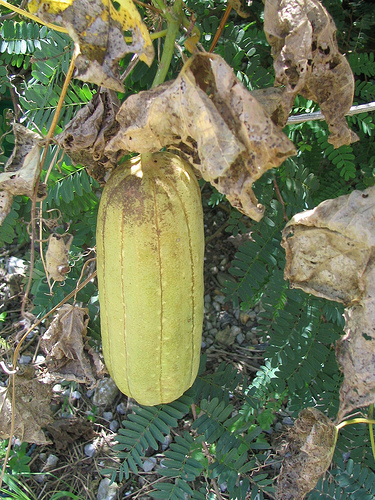
Loofah gourd (luffa cylindrica) by Laura512 [1]
Paraguayan innovator Elsa Zaldívar has won the 2008 Rolex Award for Enterprise [2] thanks to her project which consists of not only training women heads of households about processing the luffa cylindrica [3] gourd to make bath scrubbies and sandals, but also in mixing the leftovers of the vegetable sponge with recycled plastic and turning it into a strong material which can be used to make walls, a technology which might save the forests by substituting wooden planks for the plastic composite.
In the following video [en] [4], Elsa speaks about her Paraguay: the low cost housing shortage, the quickly shrinking forests and the pollution caused by plastics, and how this project can address all of these issues:
So, what is a luffa? It is a type of gourd that grows on a climbing vine. Some varieties can be eaten when young, others are bitter, but mostly the luffa (or loofah) is famous for being a bath sponge, used as an exfoliating agent to remove dead skin cells while in the shower. On the cmc-cmc blog [en] [5], the author took pictures and videos [6] of a farmer harvesting loofah gourds, peeling and cleaning them right on the spot. On the blog post, he also mentions that the seeds are sometimes ground to make a natural remedy against high blood pressure.
WilliamSabber on YouTube [pt] [7] made this short video from the garden of Mr. Adair Satler in Brazil, when he saw a really long loofah gourd, easily surpassing 120 cm (47 inches):
The good news is that in Paraguay, the loofah industry is up and growing, and some NGO's like OIPIC [es] [8] are promoting its farming as a way for families to be able to compete with the soy or cotton industries. The loofah can be used as a filling for furniture or car seats, for making handbags, shoes, and bath sponges, insoles, sandals, as pot scrubbers (they are safe for use with metal non-stick pans), as an ingredient for natural hand-made soaps and even medication against sinus problems. Another benefit for loofah planting is that because it flowers year round, it is great for bee-keping, to keep a colony healthy, well fed and increase honey production, as the Bees for Development [en] [9] website states. And well, it seems that now, thanks to Elsa Zaldívar, it will be a staple for construction as well.